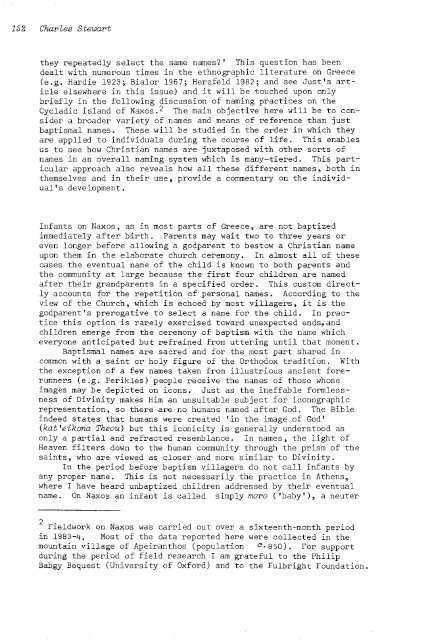CONTENTS NO.I - Institute of Social and Cultural Anthropology ...
CONTENTS NO.I - Institute of Social and Cultural Anthropology ...
CONTENTS NO.I - Institute of Social and Cultural Anthropology ...
You also want an ePaper? Increase the reach of your titles
YUMPU automatically turns print PDFs into web optimized ePapers that Google loves.
152 Charles Stewart<br />
repeatedly select the same names?' This question has been<br />
dealt with numerous times in the ethnographic literature on Greece<br />
(e.g. Hardie 1923; Bialor 1967; Herzfeld 1982; <strong>and</strong> see Just's article<br />
elsewhere in this issue) <strong>and</strong> it will be ,touched upon<br />
in the following discussion <strong>of</strong> naming practices on the<br />
Cycladic isl<strong>and</strong> <strong>of</strong> Naxos. 2 The main here will be to consider<br />
a broader <strong>of</strong> names <strong>and</strong> means <strong>of</strong> reference than<br />
baptismal names. These will be studied in the order in which<br />
are applied to individuals during the course <strong>of</strong> life. This enables<br />
us to see how Christian names are juxtaposed with other sorts <strong>of</strong><br />
names in an overall system which is many-tiered. This particular<br />
approach also reveals how all these different names~ both in<br />
themselves <strong>and</strong> in their use, provide a commentary on the individual's<br />
development.<br />
Infants on Naxos, as in most parts <strong>of</strong> Greece~ are not baptized<br />
after birth. Parents may wait two to three years or<br />
even longer before<br />
a godparent to bestow a Christian name<br />
upon them in the elaborate church ceremony. In almost all <strong>of</strong> these<br />
cases the eventual name <strong>of</strong> the child is known to both parents <strong>and</strong><br />
the community at large because the first four children are named<br />
after their gr<strong>and</strong>parents in a specified order. This custom directly<br />
accounts for the repetition <strong>of</strong> personal names. According to the<br />
view <strong>of</strong> the Church~ which is echoed by most villagers, it is the<br />
~~n~~~onT'S prerogative to select a name for the child. In practice<br />
this option is exercised toward unexpected ends,<strong>and</strong><br />
children emerge from the ceremony <strong>of</strong> baptism with the name which<br />
everyone anticipated but refrained from until that moment.<br />
Baptismal names are sacred <strong>and</strong> for the most part shared in<br />
common with a saint or holy figure <strong>of</strong> the Orthodox tradition. With<br />
the exception <strong>of</strong> a few names taken from illustrious ancient forerunners<br />
(e.g. Perikles) receive the names <strong>of</strong> those whose<br />
may be depicted on icons. Just as the ineffable formlessness<br />
<strong>of</strong> Divinity makes Him an unsuitable for iconographic<br />
representation, so there are no humans named after God. The Bible<br />
indeed states that humans were created 'in the <strong>of</strong> God'<br />
(kat'eikonaTheou) but this iconicity is<br />
understood as<br />
only a <strong>and</strong> refracted resemblance. In names, the light <strong>of</strong><br />
Heaven filters down to the human community through the prism <strong>of</strong> the<br />
saints, who are viewed as closer <strong>and</strong> more similar to Divinity.<br />
In the period before villagers do not call infants<br />
any proper name. This is not necessarily the in Athens~<br />
where I have heard unbaptized children addressed by their eventual<br />
name. On Naxos an infant is called simply moro ('baby'), a neuter<br />
2 Fieldwork on Naxos was carried out over a sixteenth-month period<br />
in 1983-4. Most <strong>of</strong> the data reported here were collected in the<br />
mountain <strong>of</strong> Apeiranthos (population a·850). For support<br />
during the period <strong>of</strong> field research I am grateful to the Philip<br />
Babgy Bequest (University <strong>of</strong> Oxford) <strong>and</strong> to the Fulbright Foundation.

















